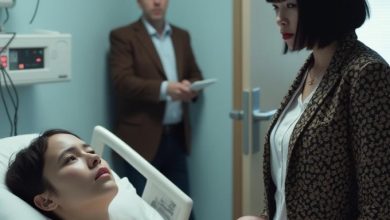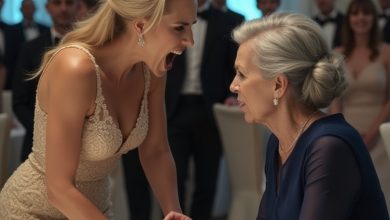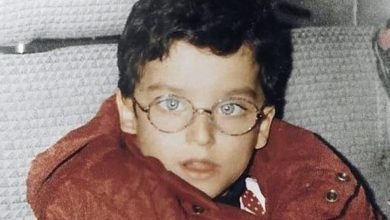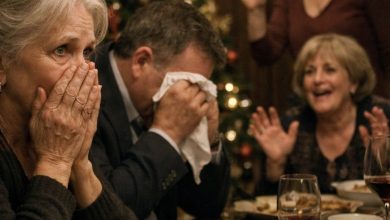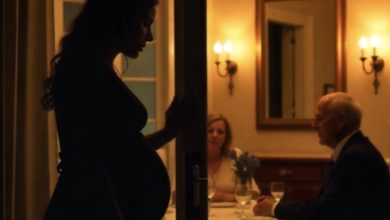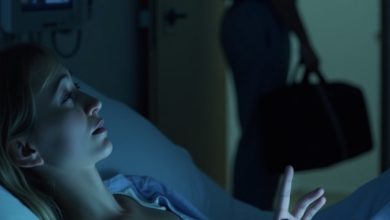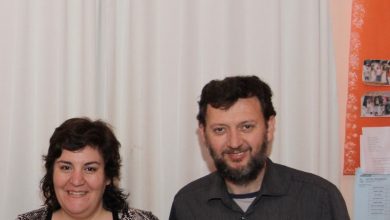In the Quiet of a Hospital Room: How a Hidden Past, a Family Riddle, and a Silver Pendant Rewrote a Fortune

“I will leave everything I own,” the dying millionaire said, “to the person who can return what I lost thirty years ago.” When the door of his hospital room finally opened and he saw who stepped inside, his chest tightened and his heart almost stopped.
“I give my whole estate to the one who brings back what I lost three decades ago.” Samuel Peterson’s voice was weak, but every word landed with the weight of a hammer in the quiet, bright room. He lay in a modern bed surrounded by machines, thin and pale, yet his eyes still burned. Around him stood his three children, watching him like hawks. Victor, the eldest, broke the silence first. He sounded like a CEO trying to control a meeting and failing anyway. He said it had to be a joke. Why gather them, the notary, and his doctor for a show? Samuel said it was not a show. It was his will. Alex, the middle son, paced from the window to the minibar, fiddling with his cuffs, talking about treasure hunts and lost reputations as if it were all a game. Elena sat closest to the bed, holding her father’s thin hand. She told Alex to stop, then begged her father to explain. They would do what he asked if he would just say clearly what he wanted.
The monitors hummed and beeped. At that same time, somewhere else in the clinic, a small drama of its own played out. A stern voice called my name. “Eva Lambert? New nurse? Morning briefing. Three minutes.” I flinched and nodded. Hope Phillips, the head nurse, stared through me like glass, reminded me this was a private clinic, and turned on her heel. I hurried after her with a quick prayer that I would survive my first day.
The Medea Private Clinic felt like a museum: glass walls, marble floors, the scent of coffee and expensive antiseptic, and complete control. After years in a crowded public hospital, I felt like a crow dropped into a room of peacocks. During the briefing I scribbled notes as fast as I could. At the end, Hope announced I would shadow a nurse named Valerie in the VIP wing. “Room Seven,” she said. The room went quiet for one beat, and I felt people glance at me. Valerie hissed that it was a rough assignment for a first day. Hope said the schedule was final. Samuel Peterson needed twenty-four-hour care.
Valerie tugged me toward the elevator and called me brave or unlucky. She asked if I read the news, then told me the basics in a low voice. Samuel Peterson owned half the city and most of the other half. He had terminal cancer. Real care now was about comfort. The real danger, Valerie said, was not his illness but his family. Three heirs. Victor ran the empire. Alex, the golden boy, was buried in debt. Elena seemed gentle and kind but still waters run deep. Valerie warned me to become a piece of furniture in that room. I should see nothing, hear nothing, and do only what the doctor ordered. I said I understood, but my hands were damp as we stopped at a heavy door of dark wood.
Inside, the fight continued. Victor argued with Dr. Glen Archer, the personal physician with a tired face and careful words. Victor demanded that his father be declared incompetent. Alex scoffed and called the will a cruel trick. The notary stood ready with papers. Samuel raised a hand and the room went still. He repeated his condition: everything would go to the one who returned what he had lost—a day that ruined his life and his good name. He turned his face to the wall. Victor snapped again, and Dr. Archer kept his calm voice. Elena cried into the blanket. Samuel told them to leave. Victor tried to argue, and Samuel roared “Leave!” with a strength that shocked everyone. Alex walked out swearing. Victor stomped after him. Elena slipped out last with a broken look. The notary and the doctor stayed.
I arrived with my tray just as the door swung open. I steadied it and knocked. Dr. Archer waved me in. I said I was scheduled to give a pain shot. The notary took his documents and left. I approached the bed, wiped Samuel’s forearm, and prepared the injection. His eyes were closed, and I wondered if he had died. Then they opened, sharp and alive. He was not looking at me, though. His gaze had fallen to my neck. My old silver locket had slid out from my collar. It was small and oval, engraved with lilies of the valley. He whispered, “Where did you get that?” His hand trembled and fell back. Dr. Archer told him to calm down. I covered the locket with my hand and said it had been my mother’s. A single tear slid down Samuel’s cheek. He told the doctor to leave, and told me to give the shot and then go. I did as he asked. He did not say another word.
The rest of my shift was a blur of rules and rituals. Valerie corrected me often: place the IV on this side, fluff the pillow every two hours, keep everything perfect because people here paid for the illusion of a perfect world. While I followed instructions, my mind kept returning to two things: the hard, cold look from my husband that morning, and the way Samuel had stared at my locket. My mother had given it to me before she died. She had told me to wear it for protection. I thought it was only a loving symbol. Now it felt like a key I did not understand.
By evening I was wrung out. The long bus ride home felt endless. My husband, Mark, sat in the kitchen with his laptop, shoes thrown in the hallway. He did not ask about my first day. He said dinner was cold. I gathered my courage and told him we needed to talk. He complained he was exhausted and said he was under pressure for a big deal. He said I should be grateful he worked so hard while I “played nurse.” My anger flared and I told him I took the new job because he said we needed more money. Then I asked who “Arthur” was. I had seen texts on his phone the other night: “Kitten, waiting for you,” and a reply signed “Arthur.” He froze, then talked his way around it, saying I was making drama because of stress. He said he would leave in the morning for a business trip to Chicago. In the bathroom I cried under the hot water. When I came out, he was packing. I handed him a clean handkerchief and felt something stiff in his jacket pocket. A passport. The photo was my husband’s. The name was not. “Arthur Walker.” Everything else matched. He left without a goodbye. My hands shook.
I returned to work without sleep. Valerie joked that Medea had chewed me up. I forced a smile. When I entered Room Seven, Samuel looked out the window, then turned toward me. He spoke my name for the first time. I checked his vitals and finished the routine. He asked me to stay. He said he did not know why he wanted to tell me his story. Maybe because I had kind eyes, or because I was not part of his family. He said people thought he had always been a tycoon. That was not true. Thirty years ago he was a young engineer, married to Lydia, with a little son named Victor. A lab assistant under him, Valerie, fell in love with him. He never encouraged it. A pipeline burst and a worker died. Someone framed him. Valerie came with papers proving the director’s crimes and offered help, but at a price—leave Lydia and be with her. He refused. Somehow the charges disappeared anyway, a poor worker took the blame, and the corrupt director retired. Samuel suspected Valerie acted on her own to save him, hoping he would love her after. He said he kept quiet, telling himself it was for his family’s sake, and he lived with that fear and silence. A year later Lydia died in a car crash. He had enemies then. He once saw Valerie talking to a powerful rival named Constantine Shaw and wondered if she was involved. He said he had lost everything on the day he chose silence. He raised Alex and Elena, the children of the man who drove the car, after their mother died giving birth to Elena. He built an empire, but carried shame. He wanted someone to return the day he should have acted like a man and clear his name. He noticed my locket again and said Lydia had one just like it, made by a jeweler with lilies of the valley. He gave it to her the day Victor was born. It disappeared after the crash.
Cold crept up my spine. My mother had left me this locket and said her cousin Irene had given it to her long ago, calling it a burden that needed to make up for guilt. I left the room shaking. I had to find my aunt.
Riverside was wet and gray. My aunt Irene looked thin and haunted. When I showed her the locket, she recoiled as if it burned. I asked who Lydia Peterson was. Irene whispered that her name used to be Valerie. She was the same Valerie. She admitted she had helped ruin the director, but swore she did not kill Lydia. She said Shaw had wanted Samuel out of the way and tried to use her. She said she had argued with Shaw on the street days before the crash, and Samuel had seen them together and assumed the worst. After the funeral he cursed her and threw her out. She found the locket at the crash site in the bushes. She kept it out of spite, then could not bear it. She changed her name, moved away, and gave the locket to my mother, the kindest person she knew. I stared at her, stunned. She begged me not to tell Samuel. She said he would destroy her. I left with a heavy heart.
Back at the clinic, the oncology wing was tense. A little girl named Lily had gotten worse. In the small café I met her father, Max. He was a simple man with grease under his nails and grief in his eyes. He said his daughter was a fighter. He asked if I was alright; I said not really. He said when life breaks you, do one simple, clear thing with your own hands—something that works the way it should. Tighten a nut. Wash a car. Make something clean. His words steadied me more than any pep talk.
In other parts of the clinic, war raged quietly. Victor tried to bully Dr. Archer into writing a medical reason to void the will. Alex hired a private detective named Peter to dig up dirt on Victor and barely listened when Peter warned him about Elena’s new boyfriend, a slippery man named Mark Lambert, also known as Arthur Walker. My husband had installed spyware on my devices and read my notes about Valerie and Shaw. He waited for me at home, placed the passport on the table, and said he knew everything. He confessed he was seeing Elena. He said soon we would have all of Samuel’s money and that I would help by taking my aunt’s story to Samuel as if it were his discovery. If I refused, he would accuse my aunt of murder and expose me as the niece of a killer. He gave me twenty-four hours. I barely slept.
When I came to work, Valerie told me Lily had been moved to ICU. Max stood outside the doors, helpless. Seeing his raw fear cleared my mind. Some things mattered; some did not. I walked to Room Seven. The room was crowded again—Victor at the window, Alex pacing, Elena in tears, and my husband standing at her side with a smug look. Victor waved paperwork from a medical council, and Dr. Archer, looking sick, said cognitive impairment needed to be considered. Samuel stared at the doctor with betrayal in his eyes. Elena begged for the “safe” choice. Mark took a step forward to push them to sign. Samuel forced himself upright and shouted for everyone to leave. Then he looked at me and said to stay.
When the door shut, he asked me to come closer. I knelt and told him everything, from my aunt’s confession to the locket and Shaw. He closed his eyes, and a tear slid down his face. He said he had always suspected Shaw. He had known deep down that Valerie might not be guilty, but pain had blinded him. He said I had given him back the day he lost—his honor and his truth. At that moment the door flew open. My husband burst in, claiming I was lying and that he was the one who found the truth. The children peered over his shoulders. Samuel did not bend. He said he had wired the room long ago. He had expected someone to try something and knew someone had used the bug in the vent. He called Mark a blackmailer and ordered him out. He looked at his children and said they cared more for money than for him. Then he turned to me and said he left everything to me, with conditions. I would administer his children’s shares and decide what they deserved. I would lead a foundation in Lydia’s name. Then he told me one more truth: my “aunt” Valerie was not my aunt at all. She was my mother. After he drove her away, she had been pregnant and hid it. A private detective named Peter had brought him the proof just hours earlier. My real name was Eva Peterson.
I felt the room tilt. Elena rushed in, sobbing that Mark had pushed her, that Victor had bribed the doctor, that she was scared. Mark ran. He tried to move money from Elena’s charity and flee, but Peter and security caught him at the airport. Later, the courts would handle the rest. Samuel died that same day, but he died at peace, holding my hand.
Two years went by. The will was examined and challenged, then upheld. I stepped into the job no one expected me to take. I was not a typical leader, but I learned quickly. I listened to people who knew the work, kept the good ones, and let go of those who fed on fear. I did not chase headlines or vanity. I put the biggest piece of our resources into building a new clinic named for Lydia Peterson, a place with modern tools and open doors. Victor and Alex received large severance distributions I approved and then left the company for good. Elena stayed near, but not in power, and worked in the foundation. She and I, as sisters, learned how to trust. It was slow, and not simple, but real.
Lily pulled through. After a hard surgery and a new therapy, the numbers started to turn. One morning, Max found me on a bench outside the clinic with a coffee in my hands. He told me Lily had smiled that day. We began to talk more. Respect became friendship. Friendship became a steady, gentle love. We held a small wedding under a maple tree behind the new clinic. Valerie came—my mother—and sat beside the aisle with her hands shaking. It took time for us to forgive each other. She had carried shame for half her life. I had carried confusion for most of mine. We chose to set it down. At the end of the night, I pressed the lily-of-the-valley locket into her hands and told her to keep it this time, not as a weight, but as a sign that the past had been faced. She insisted I wear it, and we both laughed through tears. We decided it would belong to the clinic, displayed in a small glass case with a plaque that told a short, clean truth: love, guilt, courage, and healing. People would pass it every day on their way to real work.
Some days I walk the quiet corridor of Medea—the old palace of glass—and remember the first morning when Hope Phillips barked at me to run. I remember Valerie fluffing pillows on a perfect schedule. I remember Victor’s rage, Alex’s smirk, Elena’s tears, and my husband’s cold smile. I remember Samuel’s fierce eyes and his hand, warm and shaking, as he said I had returned the day he lost. When I think of him now, I don’t see a billionaire in a bed. I see a tired father who wanted his good name back before the end. He asked the world for something impossible, and somehow the world answered through a nurse with a small locket and a stubborn heart. If there is any wisdom in what happened, it is this: truth does not vanish, even if it hides for thirty years. It waits in the most ordinary hands. Sometimes those hands belong to a mechanic washing a car at night. Sometimes to a nurse checking a pulse. Sometimes to a daughter who did not know she was a daughter until the last possible moment. And when the truth is finally spoken, it does not bring back the dead, but it does something nearly as hard. It lets the living breathe again.

